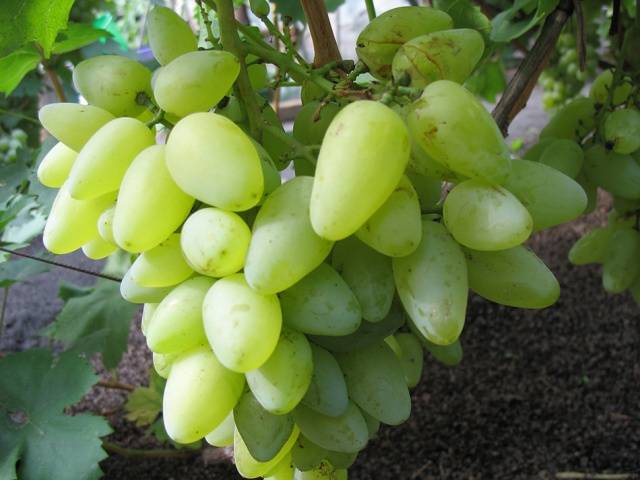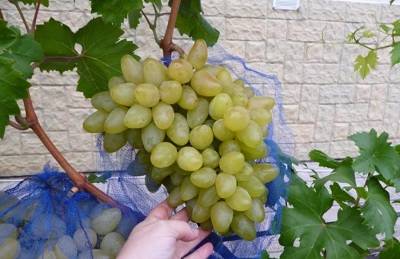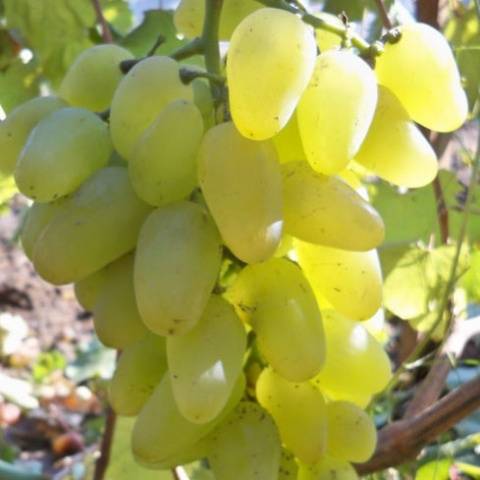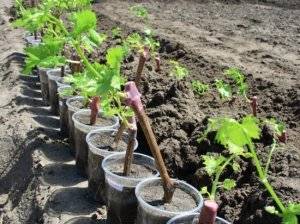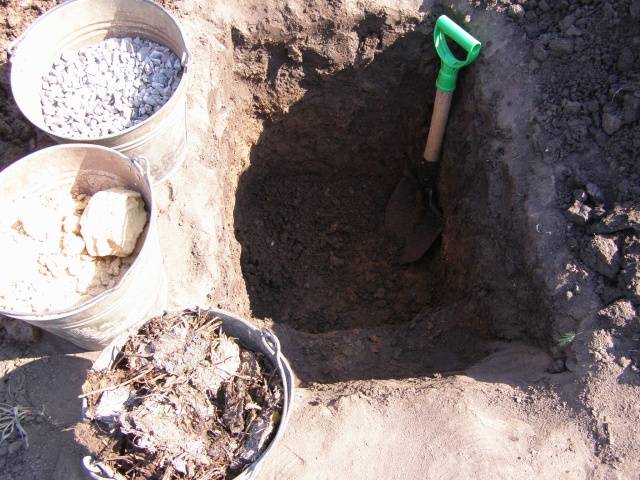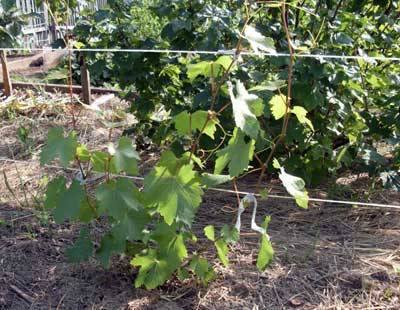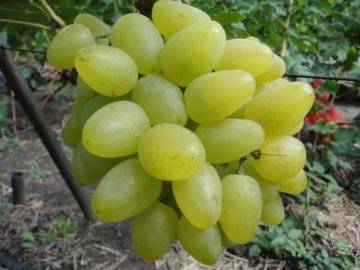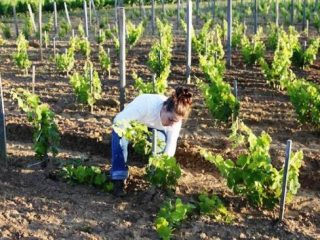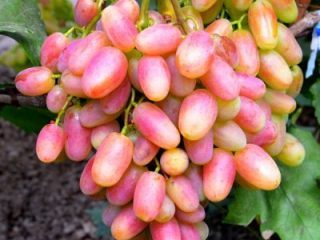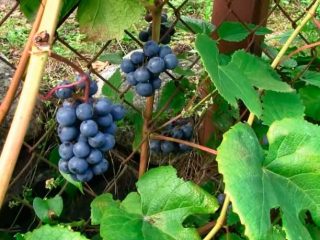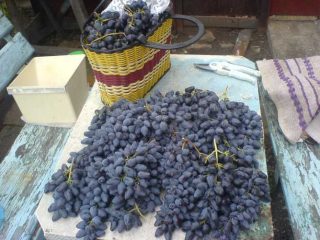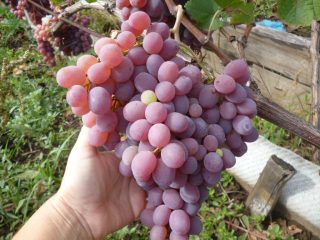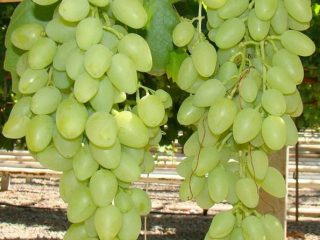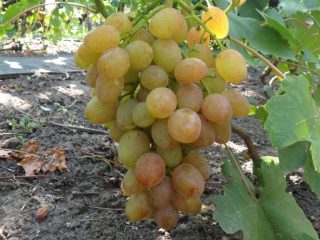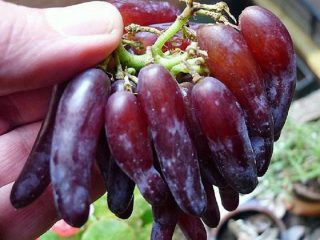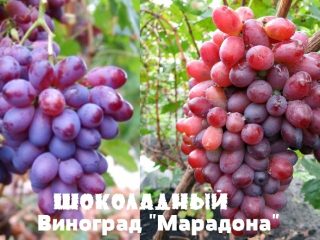Content
The Bazhena grape variety was developed relatively recently. The hybrid has high yields and is also highly resistant to many fungal diseases. However, the plant does not tolerate low temperatures well. Therefore, it is recommended to grow it mainly in the middle zone. But even in such conditions, the bushes should definitely be covered for the winter. Let's take a closer look at the characteristics of this variety.
Description
The grapes of this variety belong to the early ripening varieties. The fruits have time to ripen in about three and a half months. Given the speed of ripening, the grapes can be grown even in cold regions. The main thing is to ensure good protection of the bushes in winter. This variety can be attributed to the earliest types of grapes that are grown in the middle zone.
However, gardeners often resort to this method in order to increase frost resistance. Bazhena has poor resistance to phylloxera. Grafting in this case can increase the plant’s immunity. The variety grows and takes root quickly. Thus, you can grow a strong bush in a short time. But there are also disadvantages.It will be necessary to carry out additional pruning of the stepsons, which will not produce a harvest, but will only take away the strength of the plant.
The foliage does not grow very much, so you most likely will not have to remove it. This is done only if the leaves prevent the bunches from ripening. Bazhena will not need additional pollination, since the inflorescences are bisexual. The main advantage of the variety is its large clusters and berries (each weighs about 15 grams). The berries are yellow-green and cone-shaped. Each bunch weighs at least 700 grams and no more than 1.5 kg. Although there are single clusters weighing up to 2 kilograms.
Based on this, the following advantages of the Bazhena variety can be identified:
- The variety has large berries and clusters. It is noteworthy that this is the largest-fruited grape among all early varieties. That is why many winegrowers grow it on their plots. The beautiful appearance of the fruit allows it to be grown for industrial purposes.
- Bazhena grapes ripen very quickly. The first fruits should be expected by mid-August.
- The variety is highly resistant to fungal diseases such as downy mildew and oidium. This greatly simplifies caring for the bushes. The plant will not get sick often and will also have a pleasant appearance. By planting such grapes, you can save money on purchasing preventative agents.
- The Bazhena variety has very high yields. In order not to overload the bush, it is recommended to ration the inflorescences.
- The fruits of this variety are stored well and for a long time in suitable conditions. In addition, the berries do not lose their attractive presentation. It’s very convenient, because you can enjoy the taste of fresh grapes for a long time.
- The berries are highly resistant to changes in temperature and humidity. The fruits do not crack or dry out. The taste of grapes does not deteriorate due to weather conditions.
- Due to the presence of bisexual flowers, grapes do not pea and do not require additional pollination. Such properties save time and effort, because there is no need to plant other grape bushes.
- The berries have a pleasant taste and aroma. Many people love Bazhena precisely for its high sugar content and harmonious taste. Grapes can be eaten fresh and can also be used to prepare preserves. It makes excellent compotes and jams. The taste of compote made from such grapes is reminiscent of cherries, but also has a slight sourness.
Where to plant Bazhen grapes
It is very important to choose a grape variety suitable for a particular climate. Some winegrowers neglect this important advice, and as a result, the bush takes root and grows poorly. It is also important to consider the disease resistance of a particular grape variety.
In the southern part of the country, the scorching sun can burn tender shoots, so you should choose more suitable varieties. In northern regions, plants may freeze and simply not survive the winter. Although some winegrowers still manage to grow the variety in cold climates. In this case, it is necessary to properly cover the bushes immediately after the onset of frost.
How to prune bushes before planting
The first step is to prepare a young grape seedling for planting. This series of activities is also suitable for other grape varieties. The prepared seedling must be pruned, both roots and shoots.The root system is trimmed very little; you just need to refresh the roots. It is very important that the roots do not dry out, so before planting in the ground, the seedling should be dipped in diluted clay or wet sawdust. Then the container with the bush must be covered with plastic wrap. The seedling is taken out of the container immediately before planting.
Thanks to pruning the shoots, the root system of the bush can develop more actively. And this is the most important thing at this stage of growth. The better the bush takes root, the greater the chance that it will survive the winter well. Moreover, this variety cannot boast of high frost resistance. Temperatures below -20°C can simply destroy the plant. Therefore, in this case it would be good to take care of strengthening the root system. In hot weather, long and strong roots will provide the bush with the necessary amount of moisture.
Only one shoot is left on the bush; all unnecessary shoots should be cut off. This shoot should be the strongest and strongest. Then it also needs to be shortened. Two or three buds are counted from the roots, and the rest is cut off. This grape seedling is completely ready for planting.
Landing technology
The place for growing Bazhena must be well lit. In a temperate climate, and even in a shaded place, it will not be possible to grow a good harvest. Such early and large-fruited varieties especially need a lot of sunlight and nutrients. In infertile soil it will not be possible to grow large and sweet berries, and the amount of harvest will not be so generous.
The Bazhena variety grows best in black soil.Loose and light soil is ideal conditions for good growth of the bush and the fruits themselves. Loose soil allows the root system to grow freely and receive all the necessary substances from the ground. But even such soil needs regular loosening of the soil, so do not forget about caring for the site.
It is very important to make the hole the right size. In a hole that is too deep, the seedling will develop slowly and will not soon reach the desired height. In a small and shallow hole, the grapes may simply freeze during wintering, and the roots will not be able to extract the necessary nutrients.
Don't forget about feeding the grapes. This can be done in the fall before planting the bush. Organic fertilizers are poured into the hole and left until spring. Then, during planting of the seedling, additional minerals can be added. The amount of such fertilizers directly depends on the fertility of the soil.
You can prepare a nutritious soil mixture yourself. To do this, they take soil from their site, phosphorus-based fertilizers and peat. You can also add wood ash (up to 2 kg) and humus in an amount of about 20 kg to the mixture. In dense soil, you also need to add sand. The dug hole is filled one third with the resulting mixture. Then the seedling should be placed in the hole. Its roots should be at a depth of 40 cm. After this, the bush is covered with a mixture of sand and soil. The soil around the seedling must be compacted and watered. There is no need to skimp on water. To grow beautiful and tasty fruits, you will have to take care of timely and abundant watering of the grapes.
Prevention of diseases and pests
These grapes rarely get sick, which makes care much easier. It is highly resistant to most fungal diseases. From time to time, of course, it is necessary to prevent all kinds of diseases and pests. Most often, bushes are sprayed with iron or copper sulfate in autumn and spring.
It is important to consider some rules:
- the solution is prepared according to the instructions;
- spraying is carried out even before the buds open;
- the weather should be dry so that rain does not wash the composition off the surface.
If the grapes are sick, you will have to use more powerful drugs. It is better to do this early so that the fungus does not spread to all the bushes in the vineyard. Pests rarely bother this variety. It has been noticed that only phylloxera is a frequent visitor to Bazhena’s plantings. You can protect the crop by using phylloxera-resistant rootstock. This is the most reliable and effective way.
Conclusion
This article examined in detail the high-yielding variety Bazhena. This is an early hybrid with large clusters and berries. The photo clearly shows how large the grapes can reach. We also invite you to watch a video that briefly describes this grape variety and its care.
Reviews
